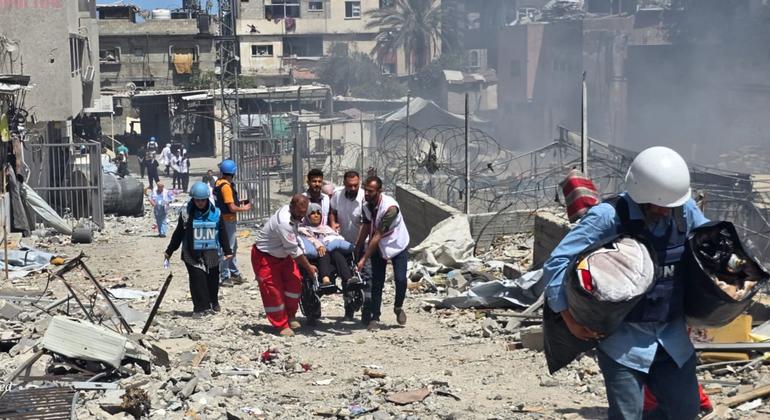With the support of the United Nations, the electrical network on the central islands of Java, Madura and Bali – which house more than 160 million people – is now improved and modernized to adapt to fluctuating energy and wind energy loads.
“Due to our cooperation with the UN, we now have a plan for an intelligent grid and we work to allow it to transparently integrate electricity from renewable energies in accordance with national priorities,” said Evy Haryadi, director of transmission and planning of the system to the public company Public Pt Perusahaan Listrik Negara (PLN). “This will represent a huge step forward in the decarbonization energy system of Indonesia. »»
As pointed out during a recent visit to Jakarta by the Special Advisor to the UN Secretary General on Climate Action and the Transition, Selwin Hart, the Smart Grid initiative – supported by the United Nations Office for Project Services (Peoples) – is an integral part of the broader assistance of the United Nations in Indonesia to ensure a fair energy transition.
Solar energy is widely used on the islands of Java, Madura and Bali.
This includes the work of the United Nations Development Program (Predict) Bring renewable energies to the distant islands not linked to the national network and the International Labor Organization (Ilo) to support the government in the development of green skills.
“The UN in Indonesia works in close partnership with the government to support its energy transition objectives in accordance with the Sustainable development objectives (SDD)), “Said Gita Sabharwal, coordinator of United Nations residents for Indonesia.” We provide rapid response solutions and technical expertise to help accelerate progress towards government objectives in green energy. »»
The country’s supply of electricity supply 2025-2034, launched in May, describes a strategic transition to a cleaner and investment-oriented energy future. It targets 42.6 GW of new renewable energy capacity and 10.3 GW of storage, while limiting a new Fossil fuel capacity to 16.6 GW. The plan is designed to align the climate commitments of Indonesia with the SDGs and improve national energy resilience.
The intelligent network and, at the base, the control center which manages the supply and demand for electricity, are crucial for this effort. The country expects an increase in the construction of renewable productions after the modernization of the Jamali control center is completed.
Historically, the electrical networks have been designed to receive electricity from sources with relatively constant production, such as coal, natural gas or hydroelectricity. However, some renewable sources work differently: solar plants only generate electricity when the sun shines and wind energy only when the wind blows. In a so-called “smart network”, the control center must be able to adjust the electricity supply of renewable energies and balance it with stable sources such as coal, depending on real-time weather conditions and consumption models. He will also use large -scale batteries to store excess electricity, for example, solar energy generated for particularly sunny periods.
Created in the early 1980s, Jamali Grid Control Center covered 79% of Indonesia’s production capacity. The design of the intelligent network system, delivered by UNOPS, allows the control center to incorporate renewable energy forecasting capacities and network analysis tools to support stability and safety, among other advanced features.
The detailed engineering design of the Jamali Main Control Center includes plans to consolidate five regional control centers in two to improve efficiency while maintaining redundancy. UNOPS has also completed the tender process and the selection of suppliers for the implementation of the design and strengthens the capacity of the PLN staff involved in the operations of the control center to effectively manage the new technology.
From design to implementation
Construction workers and engineers are now working hard on the PLN campus in Depok, just outside Jakarta, implementing the design provided by UNOPS. The completion of the control center is expected by the end of 2025. During this phase, UNOPS is responsible for monitoring the selected suppliers who build, install, configure and ultimately the commissioning of the new center.
Indonesia modernizes its electricity network.
“UNOPS has expertise and project management know-how to continue supporting us and ensuring the transparent and opportune delivery of the project, in accordance with original specifications,” said Haryadi de Pln. “At the same time, we strengthen our internal capacity to possibly resume the task.”
The work progresses on time. The new buildings are widely completed and the installation of the industrial surveillance system – central to the operation of the control center – is completed at around 40%. Based on the success of the initiative, discussions are underway to reproduce the design of the four control centers which manage the supply of electricity on other islands across the country.
UNOP supports this modernization as part of the Energy Transition Partnership of Southeast Asia (FTE), which provides technical expertise to the partner countries in the region to help their national energy commitments comply with Paris Agreement and the ODDs. FTE is a multi-donator partnership, supported by the governments of Australia, Canada, France, Germany, the United Kingdom and philanthropic donors. FTE operates in Indonesia, the Philippines and Viet Nam, as well as at the regional level of the Anase, and works in collaboration to mobilize and coordinate resources to facilitate a fair energy transition in the region.
“The upgrading of the control center promises to change the situation for the energy mixture of Indonesia,” said Sabharwal. “Our support is a striking example of United Nations assistance in intermediate income countries: working behind the scenes and providing basic technical expertise, we support the government of energy security by accelerating green transformation.”
Originally published at Almouwatin.com








